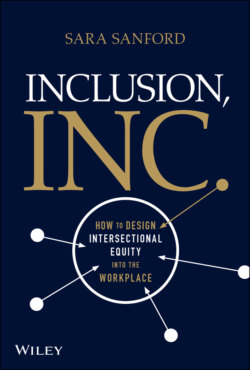Читать книгу Inclusion, Inc. - Sara Sanford - Страница 24
Leaning In to a Double-Bind
ОглавлениеI want underestimated individuals to feel as free as their peers to ask for what they deserve. But the consequences of treating Lean In as a DEI solution can do more harm than good. While women are often criticized for not negotiating more, their reticence has a rationale: Asking for more penalizes some groups in ways that it does not harm others.
In a series of studies conducted by the Harvard Kennedy School and the Harvard Law School, researchers found that when women do dare to negotiate for a pay raise, people in hiring and management roles like them less and are less likely to want to work with them. Male employees asking for the same raise do not suffer this penalty.7 In these studies, managers were presented with demands from a job candidate, who was given a gender-neutral name. The studies found that managers had strong negative reactions to the demanding job candidate when referred to throughout as “she” but not when the candidate was referred to throughout as “he.”
Beyond being viewed negatively, women often don't reap the same rewards as men when they do negotiate. A 2018 study questioned workers about their “asking” habits and compared the level of ask with the level of reward, by gender.8 Their conclusion: “Women are asking for raises as much as men. They're just not getting them.”9
Holding background factors constant, the data sets demonstrated that males and females ask equally often for promotions and raises, but women are less likely to get them. Over a lifetime of salary negotiations, this adds up, and the un-likeability risks women take each time compound.
Every time a woman negotiates, she runs the double risk of not getting what she asked for and being liked less by her peers for asking in the first place. While she may be passing up a raise if she doesn't ask, she may be putting herself in an even worse position if she does, especially if her negotiation is unsuccessful.
We're not used to women asking for pay raises or advocating for themselves, so when they do, it feels extreme. Once again, because of our biased baselines, we feel a sense of disruption to our unconscious expectations. What often gets misdiagnosed as a “confidence gap” when women don't negotiate may actually be an acute awareness of how advocating for oneself can be perceived and how that friction can harm one's career, rather than advance it.
This limit to leaning in is not specific to gender. Expectations we have of what people will do, how they will react, and where we expect to see them impact how we treat them. When these norms are disrupted, we perceive actions committed by one person differently than actions committed by another. This empowerment double-bind extends to workers of color, and Black employees most severely.
In a series of studies published in the MIT Sloan Management Review, participants were shown a number of resumes of white and Black job applicants, along with their headshots.10 The participants were asked to evaluate each job seeker and rate the likelihood that the applicant would negotiate if offered the job. Controlling for outside factors, the participants identified Black Americans as less likely to negotiate than white Americans. In the second half of the study, the job seekers and their evaluators actually interacted. Black job seekers negotiated similar numbers of offers and counteroffers as their white counterparts, but their evaluators reported that the Black job seekers had negotiated more than white job seekers. Because evaluators expected Black job seekers to negotiate less, the evaluators had an exaggerated view of their behavior. Furthermore, the perception of having been “pushy” resulted in Black job seekers receiving lower starting salaries.
Women of color face the most stringent double-binds when attempting to lean in. While white women are stereotyped as communal, caring, deferential, and concerned about others, Black women are stereotyped as assertive, angry, and “having an attitude.”11 This means that while white women face a challenge of being seen as so communal that they can't lead, Black women walk an even thinner tightrope. They have to counter preconceived notions that they are aggressive and angry by being extra accommodating; however, they cannot seem so subservient that they can't be seen as strong, individual leaders. They have even less permission to assert themselves, and even thinner margins for negotiating.
Despite being the most educated group in America,12 by percentage of their group population, and starting their careers with more ambition than white women and men,13 Black women fill only 1.4 percent of C-suite roles, while comprising 7.4 percent of the population.14 While walking the thinnest of tightropes, they still manage to ask for promotions at the same rate as men but are only 58 percent as likely to receive them.
If the research so clearly shows how bias is sabotaging these interactions, it seems that training to build awareness around our biases would be the obvious solution. Bias, unfortunately, can't be trained away.
